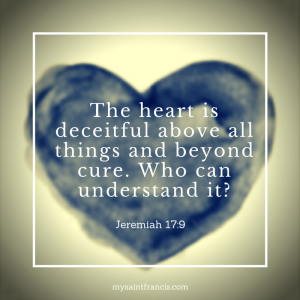Examine Yourselves ...

Earlier this week we talked about the age old wisdom passed down by the Seven Sages of ancient Greece, “Know Thyself”. This simple maxim became foundational to Western civilization.
“Know Thyself” seems simple enough. Who better to know me, than me? I mean, come on, there is no one else who knows my thoughts and feelings better, right?
Yet, one of the most brilliant Catholic minds in the past century wrote this:
One may understand the cosmos, but never the ego; the self is more distant than any star. GK Chesterton.
Why did Chesterton write this? Because he understood the truth – despite the fact that we should understand who we are better than anyone else, we do not. We lie to ourselves.
As affirmation, look at what God has to say through his scripture:
The heart is deceitful above all things and beyond cure. Who can understand it? Jeremiah 17:9
But, despite this, we’re not off the hook. We still have a responsibility to “know thyself”:
Examine yourselves, whether ye be in the faith; prove your own selves. Know ye not your own selves, how that Jesus Christ is in you, except ye be reprobates.
1 Corinthians 13:5
The bottom line is this: the ancient wisdom of Greece was really a restatement of God’s own Word. The book of Jeremiah was written at or before the same time of the Seven Sages.
Our students at St. Francis understand history and understand how God’s truth has been interwoven into that history.
More importantly, they understand that His Word is the “measuring stick” for life and, in this case, that includes taking the time to examine our own hearts and motives to understand that aside from the Savior, we are wretched human beings.
Do you know who you are?
